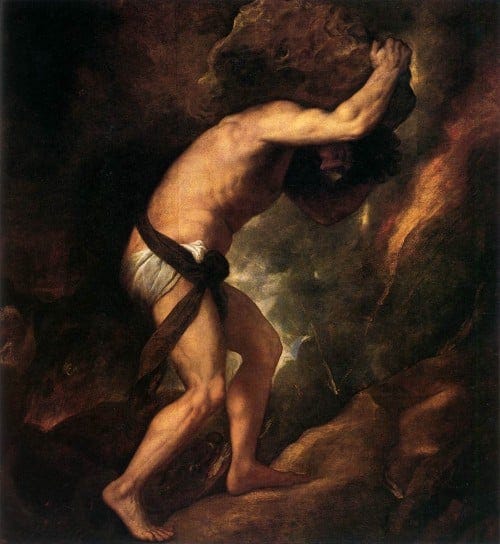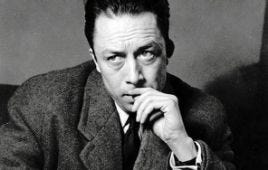This follows on from my post on Bertrand Russell, and here we meet another gloomy individual. In a previous article The ‘Enlightenment’ — Where It Has Taken Us, having quoted Bertrand Russell, Stephen Weinberg, and Jacques Monod, offering their extremely depressing assessments of the human situation, I then quoted the opening of Camus’ The Myth of Sisyphus: “There is but one truly serious philosophical problem, and that is suicide. Judging whether life is or is not worth living amounts to answering the fundamental question of philosophy”. (Sisyphus was a mythical figure, who was subjected to an eternal punishment of having to carry a very heavy stone up a hill every day, which then fell back to the bottom.)

Camus was a highly influential philosopher and novelist of the 20th century, attracting many followers. My series is an exploration of the work of the psychologist Paul Vitz, whose Defective Father Hypothesis suggests that intense atheism can be traced back to traumatic events in childhood in relation to the personal father. Vitz names Camus as one of his intense atheists (see footnote 1 for discussion).
Here is what Vitz has to say about Camus: “His father, Lucien, died in 1914 at the Battle of the Marne, when Albert was one year old. Camus reveals the importance of this loss in his autobiographical novel The First Man… His father is a central preoccupation of this work”. The protagonist is called Jacques. Part one is called “Search for the Father”, and “chapter five is completely about his father”. “Camus describes an important teacher and father figure…: ‘This man [his teacher] had never known his [Jacques’s] father, but he often spoke to Jacques of him in a rather mythological way, and in any case at a critical time he knew how to take the father’s role. That is why Jacques had never forgotten him’. In short, a melancholy search for his father runs through this last and strongly autobiographical work — a sadness broken by Jacques’s commitment to life, love, and a kind of solidarity with all people” (2).
All this would seem to confirm Vitz’s hypothesis. Further evidence of a traumatic childhood is provided by Camus’ novel The Outsider (L’Etranger), in which the main character Meursault seems devoid of emotion when he learns of his mother’s death. The opening line is dramatic: “Mummy died today” (Aujourd’hui, maman est morte). Camus’ mother has been described as “an illiterate house cleaner”, which presumably was very disappointing for him, and they “lived without many basic material possessions during his childhood in the Belcourt section of Algiers” (3). Meursault goes on to commit an act of random violence, revealing a psychopathic tendency, and possibly primal anger.
As in the case of Russell, again we see how a philosophy of life emerges from depressing, traumatic events of childhood. Meursault and Camus would both have benefited from therapy.
